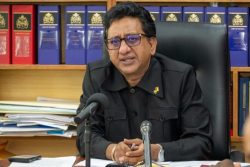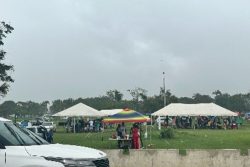Dear Editor,
The United Workers Party’s declaration that it would dissolve workers’ organisations within its first 100 days in office, should it form the next government, demands a serious national conversation. It compels us to revisit the central role of the trade union movement in shaping Guyana’s development, and to question whether a party that openly threatens the institutions built by and for the working class deserves to seek, let alone receive, our vote.
Hubert Nathaniel Critchlow, an African Guyanese and one of our officially recognised National Heroes, is the Father of Trade Unionism in the British Empire. In 1905, at just 21 years old, he began organising waterfront workers to demand dignity and justice in their working conditions and their lives.
Fourteen years later, his efforts led to the passage of the Trade Unions Ordinance (1919), legally recognising trade unions for the first time in the British Caribbean. This was not just a bureaucratic milestone—it marked the beginning of a seismic shift in Guyanese society. The trade union movement became the first mass-based social force, predating even the formation of political parties like the People’s Progressive Party (PPP) in 1950 and People’s National Congress (PNC) in 1957.
Critchlow lived and led in an era of imperial domination. As a blue-collar worker with no formal education beyond Fourth Standard (Grade Six today), he was the embodiment of the colonially oppressed. Yet his intellect, vision, and strength of character enabled him to command the attention and respect of white colonial officials, including the Governor himself. That he, with so few resources and so many obstacles, helped set Guyana on a progressive path speaks volumes about his character, and about the power of organised labour.
There is no Guyanese today in high office, no business owner, employer, or manager, whose success is not tied to the foundation laid by the working class. We are, in the main, descendants of people once deemed inferior—enslaved, indentured, and disenfranchised. The fight for recognition, equality, and justice began with workers standing together, and it is a fight that continues, even as the actors and tactics change.
In 1926, when Hubert Critchlow and fellow Caribbean labour leaders gathered in Georgetown for a historic conference, Cheddi Jagan and Forbes Burnham were just children—eight and three years old, respectively. It was labour, not politics, that first dared to envision a just society: one where workers and citizens would rule their own destiny. This conference laid the groundwork for the region’s quest for social, economic, political, civil, and cultural self-determination.
As Professor James Rose noted during the 80th anniversary of that conference in 2006, the Labour Movement’s demands included:
Socio-economic rights: Legal protection for unions, peaceful picketing, a 40-hour work week, minimum wage, old age pensions, and national health insurance.
Political rights: Federation, universal adult suffrage, limits on colonial governors, and free compulsory primary education.
Economic justice: State ownership of public utilities, land reform, and cooperative marketing for farmers.
The late Ashton Chase, trade unionist, attorney, and co-founder of the PPP, reminded us that Critchlow’s vision extended to the formation of a Caribbean Labour Federation, prison reform, the abolition of child labour, and electoral reform—including universal adult suffrage (one-man-one-vote), a goal only fully realised in 1953.
It is vital to understand: before there were votes, there were voices. And those voices were the workers who fought for the right to vote, starting in 1926 under the leadership of Critchlow.
As a fighter for workers’ upliftment, Critchlow fought not only for dockworkers but also represented East Indian sugar workers, earning their admiration and the nickname “Black Crosby,” a nod to his fierce advocacy, which mirrored that of James Crosby, the Immigration Agent-General. He respected the rights of all workers—regardless of race or ethnicity—and stood in solidarity with their struggles, from the stevedores to the sugar fields.
The trade union movement shattered colonial illusions of racial superiority and economic inevitability. It gave birth to our democracy, our rights, and our nationhood. To undermine or dissolve that legacy is not just political malpractice; it is historical amnesia.
The right to vote, and the freedom to associate, were not gifts handed down. They were won by sweat, blood, and struggle. Millions across the world have died for the right to vote, and countless more continue to defend it. To forget this, or to entrust our future to those who would casually discard it, is to dishonour that sacrifice.
We must remember: it was the workers who lit the torch that led us out of the darkness of colonialism. And it is up to us to ensure that torch is never extinguished!
Sincerely,
Lincoln Lewis









